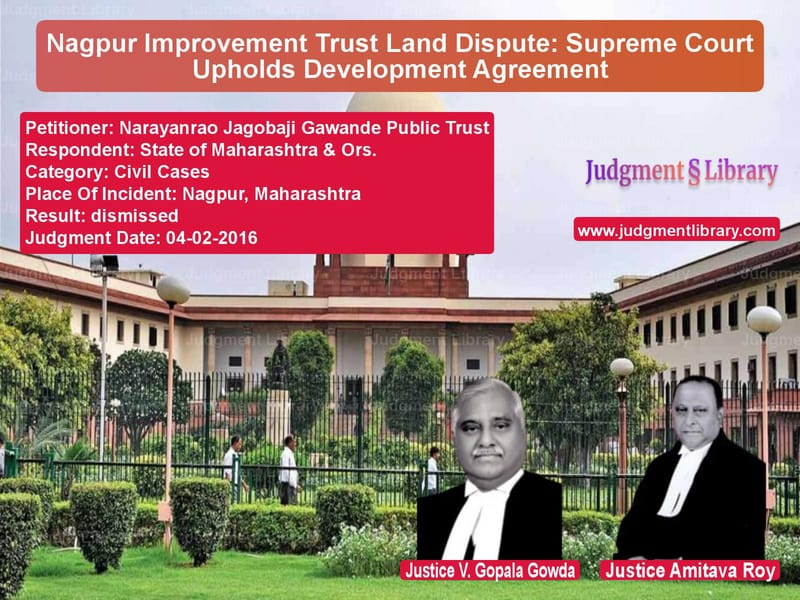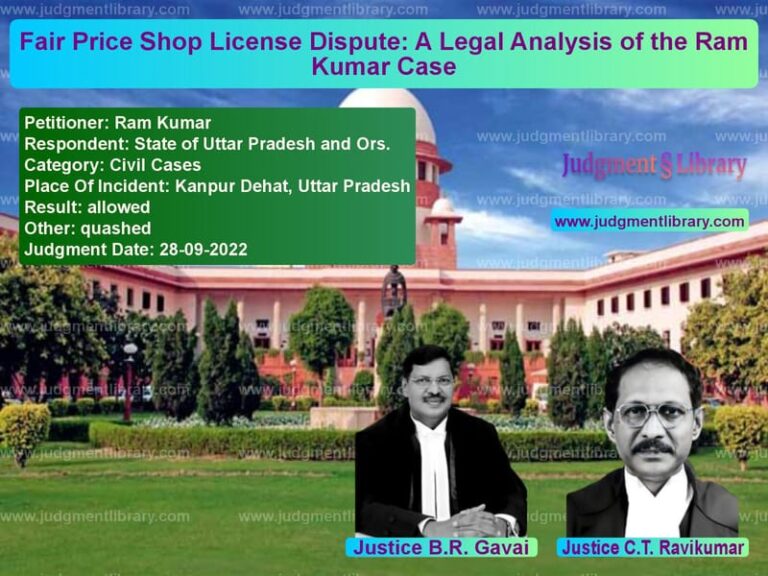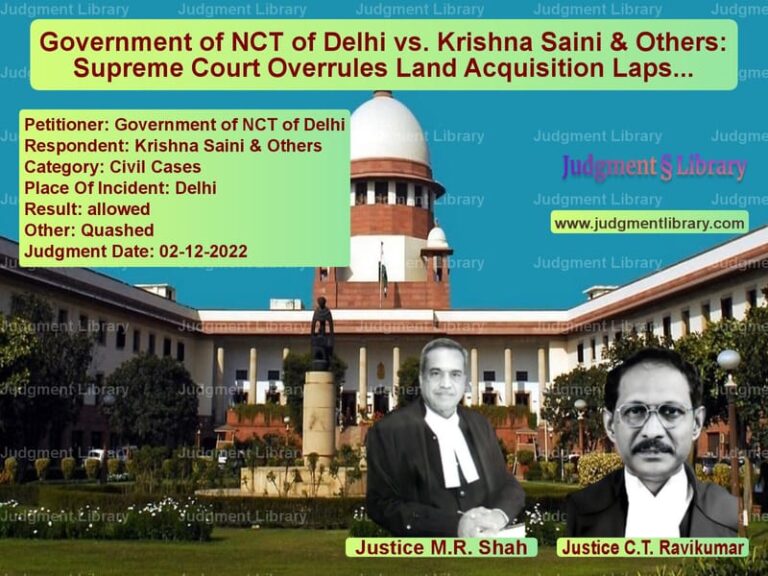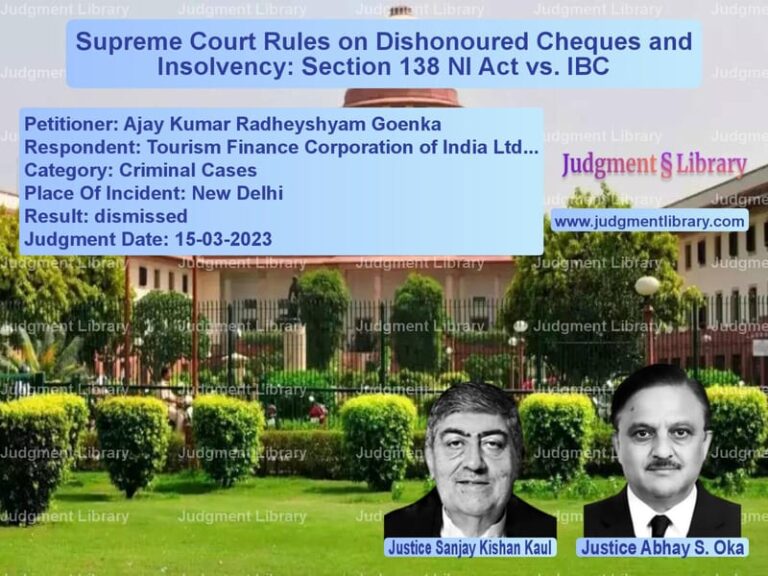Nagpur Improvement Trust Land Dispute: Supreme Court Upholds Development Agreement
The case of Narayanrao Jagobaji Gawande Public Trust vs. State of Maharashtra & Ors. revolves around a dispute over land allocation and development in Nagpur. The Supreme Court addressed whether a clause in a development agreement requiring landowners to transfer a portion of their property to the Nagpur Improvement Trust (NIT) without compensation was legal and enforceable.
Background of the Case
The case originates from the Civil Station Expansion Scheme of 1939, which was sanctioned under the Nagpur Improvement Trust (NIT) Act, 1936. The scheme aimed to develop and expand Nagpur by acquiring and regulating land use.
Key Facts:
- In 1942, Smt. Laxmibai Gawande purchased land (3.59 acres) in Nagpur.
- She later transferred ownership to her husband, Narayanrao Gawande.
- The land was part of the Civil Station Expansion Scheme of 1939, falling under NIT’s jurisdiction.
- In 1968, Gawande applied for permission to develop the land.
- He signed a development agreement with NIT, agreeing to follow its layout plan.
- The agreement reserved a portion of the land for a primary school/public utility.
- After Gawande’s death, his successors formed the Narayanrao Jagobaji Gawande Public Trust and continued the agreement.
- In 1985, a fresh development agreement was signed between the trust and NIT.
One crucial clause in the agreement required the trust to transfer the land earmarked for public utility to NIT “free of cost and without compensation.” This became the central issue of the legal dispute.
Dispute Over Land Allotment
In 1993, the Maharashtra government sanctioned land allotment for Santaji Mahavidyalaya, a senior college, under NIT’s development plan.
- In 1994, NIT reallocated land from the Gawande Trust’s layout to Santaji Mahavidyalaya.
- The trust challenged this move in the Bombay High Court, arguing that NIT had no authority to reallocate the land without compensating them.
- The High Court dismissed their petition, upholding NIT’s authority to allocate public utility land.
Petitioner’s Arguments (Narayanrao Jagobaji Gawande Public Trust)
The trust appealed to the Supreme Court, raising the following objections:
- The clause requiring free transfer of land was void under Sections 23 and 25 of the Indian Contract Act, 1872.
- The agreement was not properly registered under the Registration Act and lacked adequate stamping under the Bombay Stamp Act.
- Forcing landowners to give up property without compensation violated their fundamental rights under Article 300-A of the Constitution.
- The clause was “unconscionable” as NIT had a stronger bargaining position.
- NIT exceeded its authority under the NIT Land Disposal Rules, 1983.
Respondent’s Arguments (State of Maharashtra & NIT)
The respondents defended the clause and NIT’s authority, arguing:
- The trust knowingly agreed to the clause and benefited from the development agreement.
- The trust had already developed and sold plots under NIT’s sanctioned plan.
- Once land is earmarked for public utility in an NIT-approved plan, owners cannot later claim ownership.
- The agreement was legally binding and served public interest.
Supreme Court Judgment
On February 4, 2016, the Supreme Court, comprising Justice V. Gopala Gowda and Justice Amitava Roy, upheld the High Court’s decision and dismissed the trust’s appeal.
Key Observations by the Supreme Court:
- The trust willingly signed the agreement and benefited from it.
- The impugned clause was not arbitrary or against public policy.
- Once an owner develops land under an NIT scheme, they cannot challenge pre-agreed terms.
- Striking down the clause would undermine urban planning and set a bad precedent.
- NIT’s actions were within the framework of the Nagpur Improvement Trust Act.
The Court ruled that NIT had legally reallocated the land for public use and dismissed the appeals.
Key Legal Takeaways
- Development Agreements are Binding: Once landowners agree to a development scheme, they cannot later challenge its provisions.
- Public Utility Land Cannot be Claimed for Private Use: Land designated for public use remains under the control of the planning authority.
- Authorities Have Broad Discretion: The Court reinforced the power of planning authorities to enforce urban development schemes.
- Contracts Must be Carefully Reviewed: Landowners must understand development agreements before signing, as courts will enforce them strictly.
Conclusion
The Supreme Court’s ruling ensures that urban development plans remain intact and prevents landowners from reneging on agreements. This judgment upholds the importance of planned city expansion while reinforcing the contractual obligations of land developers.
Don’t miss out on the full details! Download the complete judgment in PDF format below and gain valuable insights instantly!
Download Judgment: Narayanrao Jagobaji vs State of Maharashtra Supreme Court of India Judgment Dated 04-02-2016-1741852466880.pdf
Direct Downlaod Judgment: Direct downlaod this Judgment
See all petitions in Property Disputes
See all petitions in Landlord-Tenant Disputes
See all petitions in Contract Disputes
See all petitions in Judgment by V. Gopala Gowda
See all petitions in Judgment by Amitava Roy
See all petitions in dismissed
See all petitions in supreme court of India judgments February 2016
See all petitions in 2016 judgments
See all posts in Civil Cases Category
See all allowed petitions in Civil Cases Category
See all Dismissed petitions in Civil Cases Category
See all partially allowed petitions in Civil Cases Category







